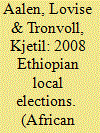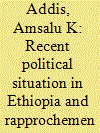| Srl | Item |
| 1 |
ID:
085978


|
|
|
|
|
| Publication |
2009.
|
| Summary/Abstract |
ETHIOPIA CARRIED OUT LOCAL ELECTIONS FOR NEIGHBOURHOOD (kebele) and county (woreda) assemblies on 13 and 20 April 2008, respectively.1 By law, these elections were supposed to be conducted in 2005, but the chaotic period after the general elections that year made it impossible to carry out the local polls. Considering the formative character of the 2005 general elections, where the opposition for the first time challenged the ruling Ethiopian People's Revolutionary Democratic Front (EPRDF), and the dramatic political crackdown in the post-election period, the conduct of the 2008 local elections is important in understanding the status and direction of Ethiopia's overall process of democratization. The constrained political context and government strategies of intimidation and harassment - leading the main opposition parties to withdraw from the local elections - signal the return of electoral authoritarianism in Ethiopia.
|
|
|
|
|
|
|
|
|
|
|
|
|
|
|
|
| 2 |
ID:
164827


|
|
|
|
|
| Summary/Abstract |
Ethiopia experienced a critical juncture in 1991 with the defeat of the military dictatorship, opening up the possibilities of a new political order. Since then the country underwent social engineering and institutional transformation emerging as a leading reformist state under hegemonic-party rule with high institutional state capacity but also a concentration, and even personalisation, of decision-making power. This approximates to a path of ‘authoritarian institutionalisation’. This article argues that Ethiopia’s institutional trajectory can be explained by the nature of coalition politics in the formative years of transition, specifically the extent to which credible challengers were excluded from transitional processes. The strategy of excluding Pan-Ethiopian parties and sideling the Oromo Liberation Front (OLF) set the country on the path of establishing a hegemonic rule by the Ethiopian People’s Revolutionary Democratic Front (EPRDF). Sustaining hegemonic rule entailed fending off threats from excluded groups in the 1990s but which coalesced into a strong electoral performance in the 2005 elections in whose aftermath the ruling party embarked on aggressive pursuit of state-directed development for political legitimation.
|
|
|
|
|
|
|
|
|
|
|
|
|
|
|
|
| 3 |
ID:
173191


|
|
|
|
|
| Summary/Abstract |
This article is designed to provide an overview of the historical and contemporary relations between Ethiopia and Eritrea as well as to examine the recent geopolitical situation and the perception of local people in Ethiopia. This paper is mainly based on secondary data analysis of the available secondary information and news reports, online articles, academic literature, interviews and discussions. The Ethio-Eritrea war brought political, economic and social security threats to the Horn of Africa. Although the economy in Ethiopia is at the developing stage, recent protests have shaken the country to its core. Since 2015, anti-government protests have been triggered over freedom of the press, land rights, under-represented seats in the coalition parties, and horizontal inequality in economic, political and social affairs among ethnic groups across the country. In this study, it is established that the unrestrained political circumstance of the current regime has created dissension and violence among the public, and thus led to escalating political, economic and security crises in Ethiopia. If this issue is not rectified quickly, the peace in the country may be jeopardised. Another issue is that although Ethiopia-Eritrea rapprochement is appreciated, the agreement between both leaders and their foreign policy orientation is still unclear.
|
|
|
|
|
|
|
|
|
|
|
|
|
|
|
|